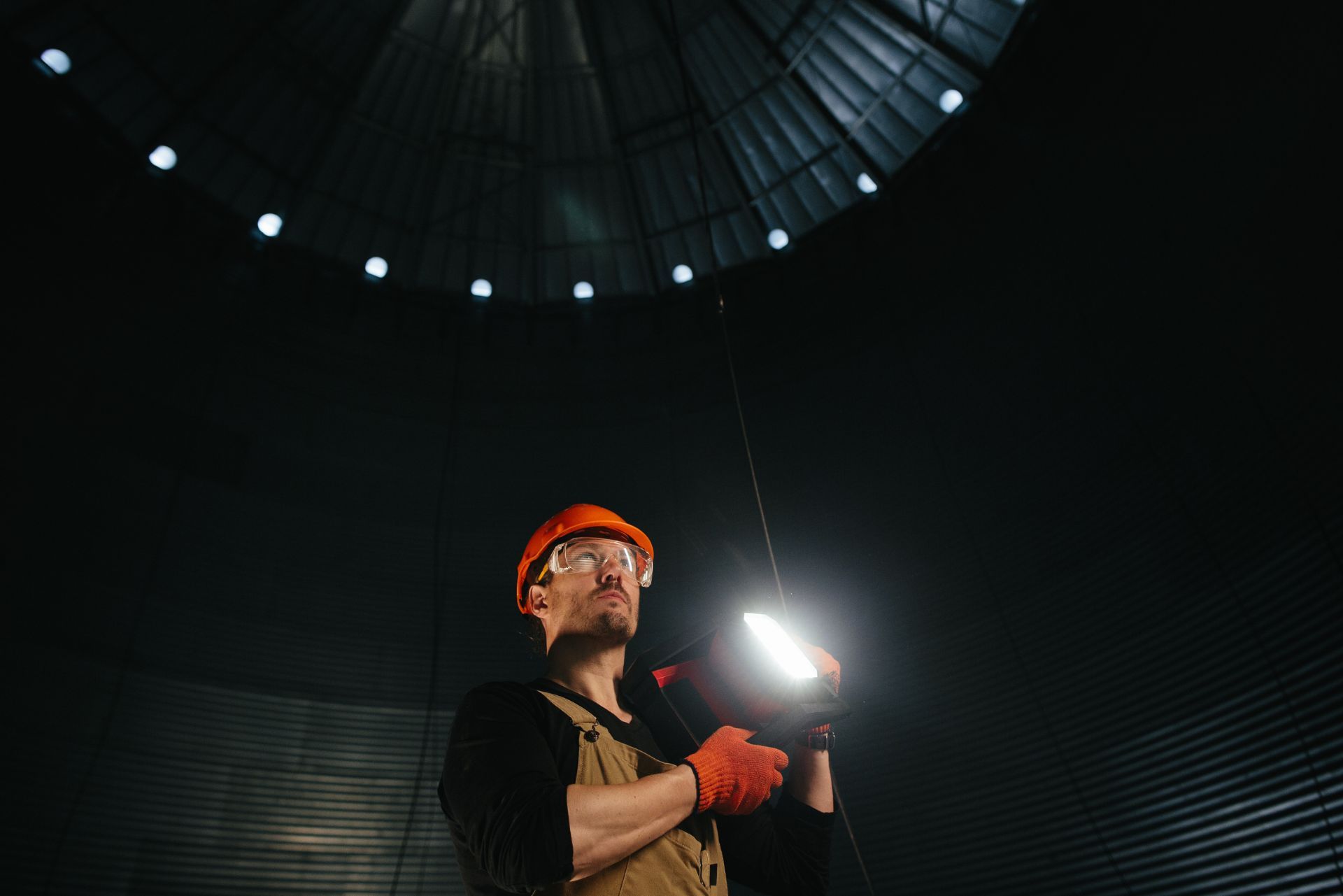Index
The Role of Theater & Stage Electricians in Live Entertainment
Understanding the Unique Risks Faced by Stage Electricians
Essential Insurance Policies for Theater & Stage Electricians
Why Specialized Insurance Matters in the Theater Industry
Tips for Choosing the Right Insurance for Theater & Stage Electricians
Contact Us
Phone
Location
Simi Valley, CA 93065
The Woodlands, TX 77382
Katy, TX 77494
The world behind the curtain is as complex and vital as the performance itself, especially when it comes to the electricians who power the magic on stage. Theater and stage electricians play a crucial role in live entertainment, ensuring that lighting, sound, and electrical systems operate flawlessly. However, with great responsibility comes the need for comprehensive insurance coverage tailored to the unique risks of this profession.
In the United States alone, the electrical industry is a massive sector, comprising approximately 240,000 businesses and employing about a million individuals, generating over $233 billion in revenue. This highlights the scale and importance of electricians across various industries, including live entertainment
(WebFX).
The Role of Theater & Stage Electricians in Live Entertainment
Theater and stage electricians are the unsung heroes of live events. Their expertise goes beyond simply wiring lights; they design, install, and troubleshoot complex electrical systems that bring performances to life. Richard Cadena, an Entertainment Technician Certification Program (ETCP)-certified entertainment electrician, emphasizes this critical role: “Without trained techs and electricians who can set up a system, test it, and troubleshoot it, there would be no show” (EC&M).
From Broadway productions to music festivals, electricians ensure that every spotlight hits its mark and every sound cue is perfectly timed. Their work often involves heavy equipment, high voltage, and tight deadlines, all of which contribute to a high-risk environment that demands specialized insurance protection.
In addition to their technical skills, theater electricians must possess a keen artistic sense. They collaborate closely with directors, lighting designers, and sound engineers to create a cohesive vision for the production. This collaboration often involves interpreting scripts and understanding the emotional beats of a performance, allowing them to design lighting that enhances the storytelling. For instance, a subtle shift in lighting can transform a scene from a moment of joy to one of despair, showcasing the power of their craft.
Moreover, the role of a stage electrician extends beyond the confines of the theater. Many are also involved in the setup and breakdown of outdoor events, such as concerts and festivals, where they face unique challenges like weather conditions and varying venue layouts. This adaptability is crucial, as they must quickly devise solutions to ensure that the show goes on, regardless of the circumstances. The thrill of live performance is matched only by the adrenaline rush of troubleshooting on the fly, making the role of a theater electrician both demanding and exhilarating.

Understanding the Unique Risks Faced by Stage Electricians
The live entertainment industry is dynamic but fraught with challenges. Electrical work on stages involves exposure to electrical hazards, working at heights, and handling expensive equipment under pressure. Additionally, the tragic 2021 Astroworld Festival crowd crush has underscored the critical importance of safety and risk management in live events, further emphasizing the need for comprehensive insurance coverage (Insurance Journal).
Moreover, staging companies face increasing insurance costs and labor challenges as the North American concert and corporate staging businesses experience record growth. These factors directly impact electricians working in these environments, making insurance not just a precaution but a necessity (AVNetwork).
Common Hazards and Liability Concerns
Electrical shocks, burns, falls from rigging, and equipment damage are some of the most common hazards. Liability issues can arise if faulty wiring or equipment failure causes injury to performers, crew, or audience members. Additionally, cancellations or delays due to technical failures or accidents can lead to significant financial losses. The repercussions of such incidents extend beyond immediate injuries; they can tarnish the reputation of production companies and lead to long-lasting legal battles, further complicating the already intricate landscape of live event management.
Safety Standards and Best Practices
To mitigate risks, the United States Institute for Theatre Technology (USITT) recommends the use of Class A Ground-Fault Circuit Interrupters (GFCIs) for personnel protection in the entertainment industry, as outlined in ANSI E1.19. Adhering to these safety standards is essential not only for protecting workers but also for meeting insurance requirements (USITT). Furthermore, regular training sessions and safety drills are critical in ensuring that all crew members are well-versed in emergency protocols. This proactive approach not only enhances the safety of the crew but also fosters a culture of vigilance and responsibility, which is vital in high-stakes environments where split-second decisions can mean the difference between safety and disaster.
In addition to GFCIs, the implementation of comprehensive risk assessments before every event is crucial. These assessments should evaluate potential hazards specific to the venue and the type of production, allowing teams to devise tailored safety plans. Incorporating technology, such as real-time monitoring systems for electrical loads, can also significantly reduce the risk of overloads and equipment failures, ensuring that the show goes on without a hitch. By prioritizing safety and adhering to best practices, stage electricians can not only protect themselves but also contribute to the overall success of live performances.
Essential Insurance Policies for Theater & Stage Electricians
Given the multifaceted risks involved, electricians in the theater and stage industry should consider a combination of insurance policies to safeguard their business and livelihood.
General Liability Insurance
This coverage protects against claims of bodily injury or property damage caused by the electrician’s work. For example, if a lighting fixture falls and injures someone or damages equipment, general liability insurance helps cover legal fees and settlements. This type of insurance is crucial in the high-stakes environment of live performances, where the audience's safety is paramount, and even a minor incident can lead to significant financial repercussions.
Professional Liability Insurance
Also known as errors and omissions insurance, this policy covers claims arising from mistakes or negligence in the electrician’s professional services. In a fast-paced live event setting, even minor errors can have significant consequences. For instance, an incorrect wiring setup could lead to power surges or equipment malfunctions, potentially jeopardizing the entire production. This insurance not only protects against financial loss but also helps maintain the electrician's reputation in a competitive industry.
Equipment Insurance
Stage electricians often use expensive tools and equipment that are vulnerable to theft, loss, or damage. Equipment insurance ensures that these assets are protected, allowing electricians to replace or repair them without financial strain. Given the high cost of specialized lighting rigs, sound systems, and other essential gear, having this coverage can be a lifesaver. Moreover, it can also cover rental equipment, which is common in the industry, ensuring that all bases are covered when working on various productions.
Event Cancellation Insurance
Live events are susceptible to unforeseen disruptions such as technical failures, weather, or safety incidents. Event cancellation insurance provides financial protection if a show or performance is canceled or postponed due to covered reasons, helping to mitigate lost income. This type of insurance can be particularly valuable for electricians who rely on a steady stream of gigs, as it can help them recover costs associated with pre-production expenses, such as travel and equipment setup, that might otherwise be unrecoverable.
Business Owner’s Policy (BOP)
A BOP bundles several types of coverage, including general liability and property insurance, into a single policy. For many electricians, this can be a cost-effective way to obtain broad protection. According to MoneyGeek, electrical business insurance premiums range from $58 to $166 monthly, with a Business Owner's Policy averaging around $166 per month. This comprehensive approach not only simplifies the insurance process but also ensures that electricians are adequately covered against a variety of risks that can arise in their line of work. Additionally, having a BOP can enhance the electrician's credibility with clients, as it demonstrates a commitment to professionalism and risk management.
Workers' Compensation Insurance
For electricians who employ others, workers' compensation insurance is essential. This policy provides coverage for medical expenses and lost wages if an employee is injured on the job. The theater and stage environment can be particularly hazardous, with risks ranging from falls to electrical shocks. By having this insurance, electricians not only comply with legal requirements but also foster a safer work environment, which can lead to higher employee morale and retention.
Cyber Liability Insurance
In today's digital age, even electricians in the theater industry must consider the risks associated with technology. Cyber liability insurance protects against data breaches and cyber-attacks, which can be particularly damaging if sensitive client information or proprietary designs are compromised. As many productions now rely on digital tools for lighting design and scheduling, having this coverage can safeguard against potential financial losses and reputational damage that could arise from a cyber incident.
Why Specialized Insurance Matters in the Theater Industry
Theater and stage electricians operate in a niche environment where standard electrical insurance might not cover all risks. Theatrical productions have unique exposures, including complex staging setups, large crowds, and high-profile events. These environments often involve intricate lighting designs, specialized sound systems, and elaborate rigging, all of which can introduce a variety of hazards that standard policies may overlook.
According to The Insurance Universe, essential insurance policies for theater productions include event cancellation, liability, and equipment insurance. These policies are designed to address the specific challenges of theatrical events, ensuring that electricians and production companies are adequately protected. For example, event cancellation insurance can safeguard against unforeseen circumstances such as severe weather or health crises that could disrupt a performance, while liability insurance protects against potential claims arising from accidents or injuries on set.
Furthermore, with the projected 6% increase in demand for electrical professionals by 2032 driven by population growth and the adoption of electric vehicles, the live entertainment sector is poised for expansion. This growth will likely increase the complexity and scale of events, underscoring the importance of having tailored insurance coverage (WebFX). As productions become more ambitious, incorporating advanced technology such as automated lighting and sound systems, the risk factors multiply. Electricians must navigate not only the technical challenges but also the legal and financial implications of their work, making specialized insurance not just beneficial but essential.
Moreover, the theater industry is characterized by its transient nature, with productions often moving from venue to venue. This mobility can complicate insurance needs, as different locations may have varying regulations and risk factors. For instance, a performance in an outdoor amphitheater might expose electricians to different environmental hazards compared to a controlled indoor theater. Understanding these nuances is crucial for securing appropriate coverage that can adapt to the unique demands of each production, ensuring that all aspects of the performance are safeguarded against potential liabilities.

Tips for Choosing the Right Insurance for Theater & Stage Electricians
Selecting the appropriate insurance requires careful consideration of the specific risks and needs associated with stage electrical work.
Assess Your Risks Thoroughly
Evaluate the types of events you work on, the equipment you use, and the potential liabilities you face. This assessment will help identify which coverages are essential. For instance, if you frequently work on large-scale productions, you may need to consider additional coverage for high-value equipment or increased liability limits to protect against potential accidents involving large crowds.
Work with Experienced Insurance Providers
Choose insurers familiar with the entertainment industry, as they will better understand the nuances and provide more relevant coverage options. An experienced provider can offer insights into common claims within the industry and help tailor your policy to address specific scenarios, such as power outages during performances or equipment failure that could disrupt a show.
Consider Bundled Policies
Bundling policies like general liability, equipment, and professional liability can often reduce costs and simplify management. Additionally, bundled policies can provide comprehensive coverage that ensures all aspects of your work are protected under one umbrella, making it easier to navigate claims and renewals.
Review Safety Compliance
Maintaining compliance with safety standards such as those recommended by USITT can not only protect your team but may also lower insurance premiums. Regular safety audits and training sessions can enhance your team's skills and awareness, further mitigating risks associated with electrical work on stage. This proactive approach not only fosters a safer work environment but also demonstrates to insurers your commitment to safety, potentially leading to better rates.
Regularly Update Your Coverage
As your business grows or changes, update your insurance to reflect new risks, equipment, or types of events. For example, if you invest in new technology or expand your services to include outdoor events, it’s crucial to ensure that your policy covers these new elements. Additionally, keeping an open line of communication with your insurance agent can help you stay informed about emerging risks in the industry, ensuring your coverage remains relevant and effective.
Conclusion: Protecting Your Career and Craft
Theater and stage electricians are indispensable to the magic of live entertainment, yet their work carries inherent risks that require specialized insurance coverage. Understanding the unique hazards, adhering to safety standards, and securing comprehensive insurance policies can safeguard electricians from financial loss and liability.
With the live entertainment industry continuing to grow and evolve, investing in the right insurance is not just prudent—it’s essential. By partnering with knowledgeable insurers and staying informed about industry developments, stage electricians can focus on what they do best: creating unforgettable experiences while staying protected behind the scenes.
For those interested in diving deeper into the electrical industry’s landscape and insurance considerations, resources like WebFX and Insurance Journal offer valuable insights.
Types of Electrician Insurance We Provide
Areas we serve




